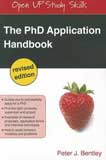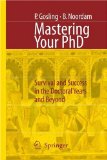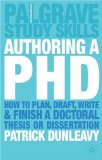The PhD Application Handbook
 The Phd Application Handbook by Peter Bentley is a comprehensive handbook for people wishing to apply for a PhD. It provides a step-by-step guide, explaining: what a PhD is; how to apply for your PhD; and how to find the right university, supervisor and project. It also provides detailed information about funding, eligibility, deadlines for different awards, and which funding is best for which student. Examples of research proposals, application forms and interview technique are given, helping you to secure your PhD place with the minimum of problems. A PhD is one of the most ambitious and exciting things you can do in your life. Upon successful completion you will be a doctor – and a world authority in your chosen area. Each year several thousand graduate students apply to do a PhD at universities in the UK. Many are not successful – they are unable to find a suitable university, or a supervisor, or decide on a suitable research project, or they cannot obtain funding to pay their fees and bills. Most students fail to obtain a PhD because they have one of these aspects wrong at the start. The “PhD Application Handbook” is designed to help prospective PhD students achieve their ambition. If you want to do a doctorate in the UK or anywhere else in the English-speaking world of academia, this book is essential for you.Paperback: 192 pages; Publisher: Open University Press (Revised Edition: 2012)
The Phd Application Handbook by Peter Bentley is a comprehensive handbook for people wishing to apply for a PhD. It provides a step-by-step guide, explaining: what a PhD is; how to apply for your PhD; and how to find the right university, supervisor and project. It also provides detailed information about funding, eligibility, deadlines for different awards, and which funding is best for which student. Examples of research proposals, application forms and interview technique are given, helping you to secure your PhD place with the minimum of problems. A PhD is one of the most ambitious and exciting things you can do in your life. Upon successful completion you will be a doctor – and a world authority in your chosen area. Each year several thousand graduate students apply to do a PhD at universities in the UK. Many are not successful – they are unable to find a suitable university, or a supervisor, or decide on a suitable research project, or they cannot obtain funding to pay their fees and bills. Most students fail to obtain a PhD because they have one of these aspects wrong at the start. The “PhD Application Handbook” is designed to help prospective PhD students achieve their ambition. If you want to do a doctorate in the UK or anywhere else in the English-speaking world of academia, this book is essential for you.Paperback: 192 pages; Publisher: Open University Press (Revised Edition: 2012)
Mastering Your PhD
 Mastering Your PhD: Survival and Success in the Doctoral Years and Beyond by Patricia A. Gosling and Bart D. Noordam guides students thinking about entering a PhD program, doctoral students at the beginning of their research and graduate student feeling stuck or frustrated. In general, this great manual effectively helps PhD students through their grad school years. Filled with practical advice on getting started, communicating with your supervisor, staying the course, and planning for the future, this book is a handy guide for graduate students who need that extra bit of help getting started and making it through. While mainly directed at PhD students in the sciences, the book’s scope is broad enough to encompass the obstacles and hurdles that almost all PhD students face during their doctoral training. Who should read this book? Students of the physical and life sciences, computer science, math, and medicine who are thinking about entering a PhD program; doctoral students at the beginning of their research; and any graduate student who is feeling frustrated and stuck. It’s never too early — or too late! This second edition contains a variety of new material, including additional chapters on how to communicate better with your supervisor, dealing with difficult people, how to find a mentor, and new chapters on your next career step, once you have your coveted doctoral degree in hand. Paperback: 156 pages; Publisher: Springer (2010)
Mastering Your PhD: Survival and Success in the Doctoral Years and Beyond by Patricia A. Gosling and Bart D. Noordam guides students thinking about entering a PhD program, doctoral students at the beginning of their research and graduate student feeling stuck or frustrated. In general, this great manual effectively helps PhD students through their grad school years. Filled with practical advice on getting started, communicating with your supervisor, staying the course, and planning for the future, this book is a handy guide for graduate students who need that extra bit of help getting started and making it through. While mainly directed at PhD students in the sciences, the book’s scope is broad enough to encompass the obstacles and hurdles that almost all PhD students face during their doctoral training. Who should read this book? Students of the physical and life sciences, computer science, math, and medicine who are thinking about entering a PhD program; doctoral students at the beginning of their research; and any graduate student who is feeling frustrated and stuck. It’s never too early — or too late! This second edition contains a variety of new material, including additional chapters on how to communicate better with your supervisor, dealing with difficult people, how to find a mentor, and new chapters on your next career step, once you have your coveted doctoral degree in hand. Paperback: 156 pages; Publisher: Springer (2010)
Authoring a PhD Thesis
Authoring a PhD Thesis: How to Plan, Draft, Write and Finish a Doctoral Dissertation by Patrick Dunleavy contains tons of helpful advice and practical suggestions, and an illustrated guidance of the thesis-writing process. This book might help you get through it! The usefulness of this book lays in covering a broad range of practical creation aspects, such as: having creative ideas, working out how to organize them, writing up from plans, upgrading text, and finishing it speedily and to a good standard. It also involves being examined and getting work published. This book provides a huge range of ideas and suggestions to help Ph.D. candidates cope with both the intellectual issues involved and the practical difficulties of organizing their work effectively.Paperback: 256 pages; Publisher: Palgrave Macmillan (2005)
Do you know a useful PhD book which we should add to our list? Please drop us a line!
